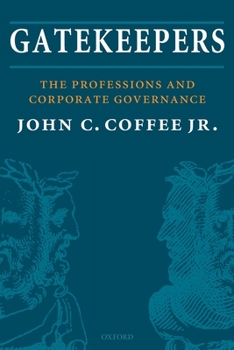Gatekeepers: The Professions and Corporate Governance
Select Format
Select Condition 
Book Overview
In the wake of a series of corporate governance disasters in the US and Europe which have gained almost mythic status - Enron, WorldCom, Tyco, Adelphia, HealthSouth, Parmalat - one question has not yet been addressed. A number of 'gatekeeping' professions - auditors, attorneys, securities analysts, credit-rating agencies - exist to guard against these governance failures. Yet clearly these watchdogs did not bark while corporations were looted and...
Format:Paperback
Language:English
ISBN:0198835280
ISBN13:9780198835288
Release Date:June 2019
Publisher:Oxford University Press
Length:400 Pages
Weight:1.60 lbs.
Dimensions:0.9" x 6.1" x 9.1"
Customer Reviews
3 ratings
A clear-eyed view on how to fix corporate gatekeeping
Published by Thriftbooks.com User , 15 years ago
Although everyone may be fascinated by the corporate scandals of the past decade, figuring out how to make sure they don't happen again is what's really important. John C. Coffee Jr. shows how the professions of accounting, law, ratings and securities analysis let investors and consumers down. He is not interested in assigning blame but rather in demonstrating how changing corporate cultures, conflicts of interest, diminishing competition and declining professional standards combined to leave the public vulnerable. After explaining who the gatekeepers are, what their duties were in the past and what they do now, Coffee provides valuable recommendations for creating a viable gatekeeping function for the future. His ideas are sensible and he is modest, admitting that they are not complete or perfect. His writing about this complex subject is surprisingly clear, and his ability to illustrate his points with cogent examples from the headlines makes for an interesting read. getAbstract recommends this book to executives, board members and others with a stake in good corporate governance.
How the gatekeeping professions came to be and why the let us down
Published by Thriftbooks.com User , 15 years ago
John C. Coffee Jr. takes an interesting look at the role the gatekeeping professions failed us in the major scandals at Enron, WorldCom, Parmalat and many others. These professions are accounting (auditing), attorneys, the credit rating agencies, and securities analysts. He provides us with a history of how each of these professions came into being, how they became gatekeepers in protecting the public by providing reliable information over many decades. However, things changed over time and he shows us how it happened. While it was different for each, the primary source was a change in incentives. While I can't recount everything in these short comments, you will see how the change in compensating CEOs from pay to equity and the expansion of auditing firms into more profitable consulting services changed auditing. The rise of the in-house legal counsel also changed the role of the legal advice corporations sought, received, and used. Rating agencies probably suffered by the lack of competition and a kind of groupthink. Securities analysts were conflicted by who paid for their advice and the impact negative ratings would have on their firm's customers and their own industry standing. I think this is a useful and informative book. Reviewed by Craig Matteson, Ann Arbor, MI
Timely for 2008 Elections
Published by Thriftbooks.com User , 16 years ago
The book's timing could hardly be better, since substantive reform only seems to occur with a crisis. Implosion of the savings and Loan Industry brought us the Federal Institutions Reform, Recovery and Enforcement Act of 1989. Accounting scandals at Enron, WorldCom, etc. brought us the Public Company Accounting Reform and Investor Protection Act of 2002 (Sarbanes Oxley). The subprime debacle is likely to bring significant reform as well. It would be great if those advising Presidential candidates would consult Gatekeepers in preparing such proposals. Coffee focuses on auditors, attorneys, securities analysts and credit-rating agencies who inform and advise corporate managers, boards and shareholders. After a brief introduction explaining the failure of gatekeepers and a comparative overview of their roles internationally, Coffee devotes a chapter to each of the four groups. He typically provides an informative history, a review of current issues such as conflicts of interests, and an evaluation. He wraps up the book with a thematic discussion of what's gone wrong and how it might be fixed. In general, gatekeepers act as "reputational intermediaries" by verifying corporate statements to investors. When trusted and successful, this lowers the cost of capital. However, as Coffee notes, "Watchdogs hired by those they are to watch typically turn into pets, not guardians," especially in the euphoric environment typified by stock or housing bubbles, when the public is typically lulled into complacency. As management incentives were aligned with shareholders through options, income smoothing gave way to robbing the future for earnings that could be recognized immediately. Coffee explains how Enron's audit committee was blinded by professional advisers who fed it only the information senior management wanted them to have. Auditors were retrained and incentivized to sell consulting services. He explains why fund managers and gatekeepers tend to herd and why, until four days before Enron declared bankruptcy, its debt was rated "investment grade.' Only those with a financial self-interest, the short-sellers, searched beyond the surface and predicted Enron's accounting restatements. At WorldCom, "the limited due diligence that was conducted appears to have been constrained by the need not to offend the client" and the actual fraud was detected by the firm's internal auditors. Coffee helps the reader see from a different perspective. For example, while some studies have found that audit firms with high consulting revenues were more likely to acquiesce to questionable earnings management, others found no such correlation. Coffee points out that instead of looking what is already in hand, we should look to possibilities. "The real conflict lies not in the actual receipt of high fees, but in their expected receipt." That explains why audits became a "loss leader" to obtain consulting services. Similarly, disclosure of conflicts of interests often does n






